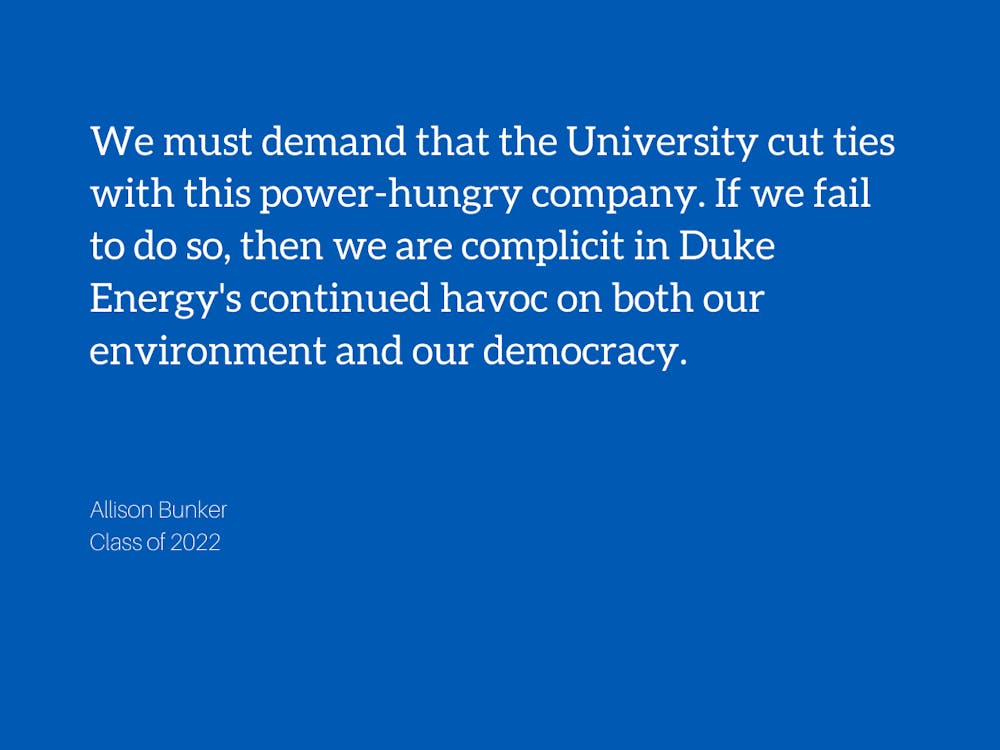On October 31, the North Carolina General Assembly passed a bill aimed to finance storm recovery costs. However, a provision of the bill that would have allowed Duke Energy to raise rates indefinitely was removed after long standing public pressure. Given the corporation’s monopoly status in the state, this change would have allowed them to rip off customers and create an even deeper disparity in energy access.
Though the incriminating provision is no longer a threat, the power and abuse of Duke Energy continue. As Duke students, many of us come from out of state where the monopoly and reach of Duke Energy are not familiar conditions. I was almost a full year into my Duke career before I heard anything about Duke Energy. Though Duke Energy is technically a separate entity from the university, we are students of a University that was funded by Duke Energy money and therefore responsible for understanding the dark sides of this corporation’s business model.
For years, Duke Energy has been wreaking havoc on North Carolina and the broader United States. The local energy justice nonprofit NC Warn describes Duke Energy’s business model as “build power plants, raise rates, control government and distort public debate.” As the largest energy provider in the United States and a monopoly in North Carolina, Duke energy has used this business model to take over the state.
During Duke Energy’s campaign against rooftop solar, the corporation targeted African American leaders in the state, misinforming them that solar energy in North Carolina would hurt the poor. However, a letter from community leader Rev. Nelson Johnson reinforced solar as helping “all customers by reducing overall electricity usage, thus reducing the need to keep building expensive power plants and continually raising customer rates.” Duke Energy’s monopoly in the state of North Carolina allows them to abuse their power, and they do so by spreading lies.
One such example is clear through Duke Energy’s disposal of coal ash at six different sites in North Carolina. In 2014, Duke Energy spilled upwards of 6 tons of coal ash, polluting North Carolina air and water to the extent that the state was deemed one of the sites with the “worst contamination” of coal ash. At Duke Energy’s Allen Steam plant in Belmont, the cobalt contamination was 500 times worse than healthy levels. It is estimated that clean up at even one contaminated location will take 32 years. When North Carolina’s environment department demanded that Duke Energy clean up coal ash contamination at six of its power plants in April of 2019, Duke Energy appealed the decision, arguing that the request was not based on “scientific evidence.” Prior to this cleanup request, Duke Energy had already been approved by the state’s utilities commission to raise rates on customers in order to compensate for the $546 million they have already paid in clean up costs.
How is it that Duke Energy gets away with these inhumane actions? This is where the second part of their plan comes in: controlling government through donations. In 2017, Duke Energy spent over a million dollars lobbying in NC, over a million dollars on local and federal PACs and at least a million dollars influencing the Chamber of Commerce in NC. This corruption can be found among politicians of all parties and from all areas of the state. A tool created by Energy Justice NC, a coalition of organizations in the state that are fighting for energy choice in North Carolina, allows constituents to calculate the amount of money their state senators and representatives are receiving from energy monopolies. Given that Duke Energy is a corporation, it could be argued that we, as consumers, can’t expect any better of them than to chase profits, no matter the cost. However, even if this is true, we must demand better of our lawmakers and educational institutions to assert checks on Duke Energy's power.
As Duke students, we must understand the legacy of Duke Energy. Duke Energy abuses its power, harming people across the state of North Carolina and beyond. Duke Energy was a builder of wealth for the family who endowed our University, and the entanglements of the two continue today.
Duke planned to allow Duke Energy to build a fracking gas power plant on Duke’s campus until April of 2018, when the University announced it would not allow construction (after facing pushback from student and community activists). Just last week, a piece in The Chronicle condemned the fact that this year’s "Energy Week" was sponsored by none other than Duke Energy.
We must demand that the University cut ties with this power-hungry company. If we fail to do so, then we are complicit in Duke Energy's continued havoc on both our environment and our democracy.
Allison Bunker is a Trinity sophomore. She wrote this piece with the research support of NC Warn. You can sign the NC energy justice petition to end the Duke Energy monopoly, and look out for on-campus opportunities to learn more next semester.
Editor's Note: This column was updated at 12:20 a.m. to remove speculation regarding financial ties between Duke University and Duke Energy.
Get The Chronicle straight to your inbox
Sign up for our weekly newsletter. Cancel at any time.

